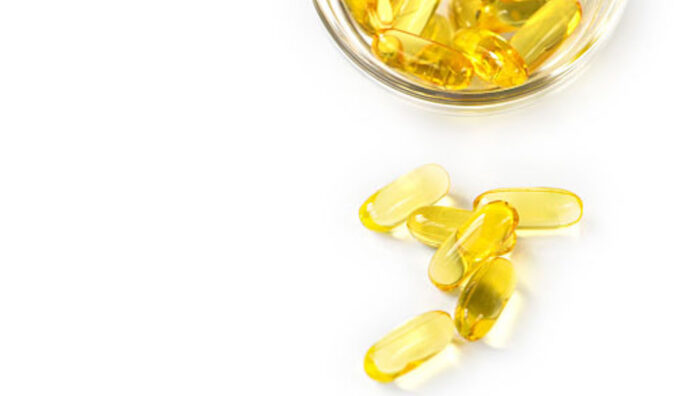Many patients use fish oil in the hope of relief from inflammatory conditions or to reduce risks of cardiovascular disease. As non-prescription complementary medicines, it is likely many patients are not abreast of how to use fish oil in a way which will achieve therapeutic benefit.
Why supplement?
Mammals are unable to synthesise omega-3 acids and so dietary sources are important.1 Foods like cold-water fish, nuts, and plant oils provide the highest density of omega-3, although therapeutic doses from diet is unlikely to be achieved.2
How do omega-3 acids achieve a therapeutic effect?
Initially it was thought that omega-3 acids were important for cell membrane fluidity, with their weird, bent chains disrupting the sea of mostly saturated straight lipid chains.2 Maybe this did something for energy transduction and proton channels? Turns out – no.
A more contemporary view of fish oil involves anti-inflammatory activity and the prostaglandin system – potentially providing benefit in cardiovascular conditions and osteoarthritis.3
Do fish oil supplementations work?
Omega-3-containing fish oils have been extensively studied – the headline is that omega-3 supplements do not lower all-cause mortality4 or cardiovascular mortality,5 but may have some benefit in inflammatory conditions.6
There is also some evidence for cardiovascular benefit in patients with heart disease.7 The Mediterranean Diet Study had data extrapolated that suggested omega-3 supplementation may achieve the same longevity results, however it still appears that only food sources are associated with these benefits.6
Most people taking omega-3-containing fish oil supplements don’t take enough.
Guidelines for omega-3 supplementation in musculoskeletal conditions in adults recommend a minimum of 2.7g of fish oil per day, with 2-4g daily recommended for high triglycerides.3,9 This dose poses a significant pill burden and it is no surprise that so many patients do not achieve the required daily dose.
Persistence is also an issue
The high pill burden, and general issue of persistence means that many patients abandon treatment early, often before efficacy can be shown.10
Choosing formulations which reduce pill burden are important
The Therapeutic Guidelines suggests daily doses can range from 3-9 capsules depending on strength – using the highest tolerated dose will minimise pill burden and improve adherence.3
Liquid formulations are refined to have high concentrations of omega-3 and may be useful for those who cannot tolerate large capsules.
What if my patients don’t like the taste of fish?
Adverse effects such as reflux, fishy taste, or diarrhoea are common and may be the reason patients stop taking the supplement. These may be overcome by taking it with food to reduce the risk for reflux, or storing the medication in the freezer – which will reduce the oxidation of the fish oil and thus development of the fishy taste and anecdotally can help with GIT tolerability.8
References
- Lee JM, Lee H, Kang, SB, et al. Fatty Acid Desaturases, Polyunsaturated Fatty Acid Regulation, and Biotechnological Advances, Nutrients, 2016 Jan; 8(1) 23
- Omega-3 fatty acids. National Institute of Health. 2022. At: ods.od.nih.gov/factsheets/Omega3FattyAcids-Consumer/
- Cardiovascular Expert Group. Cardiovascular, Melbourne: Therapeutic Guidelines; 2010.
- De Santis A, Verela Y, Sot J, et.al, Omega-3 polyunsaturated fatty acids do not fluidify bilayers in the liquid-crystalline state, Nature, November 2018, 16240
- Aung T, Halsey J, Kromhout D, Associations of Omega-3 Fatty Acid Supplement Use With Cardiovascular Disease Risks, JAMA Cardiology, 2018 3(3) 225
- Katz J, Goldberg R, A meta-analysis of the analgesic effects of omega-3 polyunsaturated fatty acid supplementation for inflammatory joint pain, Pain, 2007 May;129(1-2):210-23
- Turner D, Shah PS, Steinhart AH, Zlotkin S, Griffiths AM. Maintenance of remission in inflammatory bowel disease using omega-3 fatty acids (fish oil): A systematic review and meta-analyses. Inflamm Bowel Dis 2011;17:336–45
- LeWine H, Fish oil: friend or foe?, Harvard Health Blog. 2020. At: health.harvard.edu/blog/fish-oil-friend-or-foe-201307126467
- Covington M, Omega-3 fatty acids, Am Fam Physician. 2004;70(1):133-140
- Loadsman P, Moses G, McGuire T, et.al Your questions about complementary medicines answered: fish oil, AFP, 2015 Volume 44, Issue 7, July 2015



 Professor Margie Danchin[/caption]
Professor Margie Danchin[/caption]

 Dr Peter Tenni[/caption]
Dr Peter Tenni[/caption]
 How should we deprescribe gabapentinoids, according to the Maudsley Deprescribing Guidelines[/caption]
How should we deprescribe gabapentinoids, according to the Maudsley Deprescribing Guidelines[/caption]



 Pharmacists have always prescribed, but they have the potential to prescribe much more
Pharmacists have always prescribed, but they have the potential to prescribe much more






